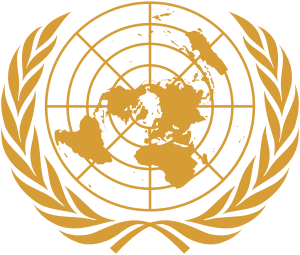United Nations Supervision Mission in Syria
| United Nations Supervision Mission in Syria | |
 | |
| Abbreviation | UNSMIS |
|---|---|
| Formation | 21 April 2012 |
Head |
Robert Mood until date Babacar Gaye |
Parent organization | United Nations Security Council |
The United Nations Supervision Mission in Syria (UNSMIS) is a United Nations peacekeeping mission in Syria, set up in 2012 as a result of United Nations Security Council Resolution 2043 in response to the Syrian Civil War.[1] It was commanded by Norwegian major general Robert Mood[2] until 20 July 2012 followed by Lieutenant General Babacar Gaye from Senegal. Although observers remain in the country, Mood suspended their mission on June 16, 2012 citing "escalating violence."[3] Observers will conduct no further patrols and stay in their current positions until the suspension is lifted. On 20 July 2012, the Security Council extended UNSMIS for a final period of 30 days. According to resolution 2059, the Council would only consider more extensions in the event that the Secretary-General reports and the Security Council confirms the cessation of the use of heavy weapons and a reduction in the level of violence sufficient by all sides to allow UNSMIS to implement its mandate.[4]
Make-up and strength
Resolution 2043 authorises up to 300 unarmed military observers, plus an appropriate civilian component. As of 30 June 2012, UNSMIS consisted of 278 military observers, 81 international civilian staff and 40 local civilian staff. Military personnel came from Armenia, Bangladesh, Benin, Brazil, Burkina Faso, Burundi, Cambodia, Chad, China, Croatia, Czech Republic, Denmark, Ecuador, Egypt, Fiji, Finland, France, Ghana, Indonesia, Ireland, Italy, Jordan, Kenya, Kyrgyzstan, Mauritania, Morocco, Nepal, Netherlands, New Zealand, Niger, Nigeria, Norway, Paraguay, Philippines, Romania, Russia, Senegal, Slovenia, Sweden, Switzerland, Togo, Yemen and Zimbabwe.[5]
On 25 July 2012 Under-Secretary-General for Peacekeeping Operations Hervé Ladsous announced that about half of the military observers have been sent back to their countries.[6]
On August 16, France's UN Ambassador Gerard Araud, the current Security Council president, said the conditions to extend the mission beyond August 20, among which a significant reduction of violence, were not met and the mission would end. Russia organised new UN meetings in New York on Friday, August 17, and calls on all sides to end the violence.[7]
On 20 July, the Security Council extended UNSMIS for a final period of 30 days. According to resolution S/RES/2059, the Council would only consider further extensions to the mission ‘’in the event that the Secretary-General reports and the Security Council confirms the cessation of the use of heavy weapons and a reduction in the level of violence sufficient by all sides to allow the UNSMIS monitors to implement their mandate. The two conditions set by the Council were not met. This was reported in a Secretary-General’s letter to the Security Council on 10 August, in which he also set forth his observations on the future work of the United Nations in Syria.
The UNSMIS mandate came to an end at midnight on 19 August 2012.
See also
References
- ↑ "UNSMIS Background". United Nations. Retrieved 2012-05-29.
- ↑ "UN leads global calls for action against non violence in Syria". The Times of India. 2012-05-27.
- ↑ "UN suspends Syria peace mission". BBC News. Retrieved 16 June 2012.
- ↑ "UNSMIS Mandate - United Nations Supervision Mission in Syria". Un.org. Retrieved 2013-12-07.
- ↑ "UNSMIS Facts and Figures - United Nations Supervision Mission Syria". Un.org. Retrieved 2013-12-07.
- ↑ "Transcript of the press conference by Herve Ladsous : Damascus 25 July 2012" (PDF). Un.org. Retrieved 2013-12-07.
- ↑ Issacharoff, Avi (2012-08-16). "UN Security Council decides not to extend observers mission in Syria Israel News". Haaretz. Retrieved 2013-12-07.